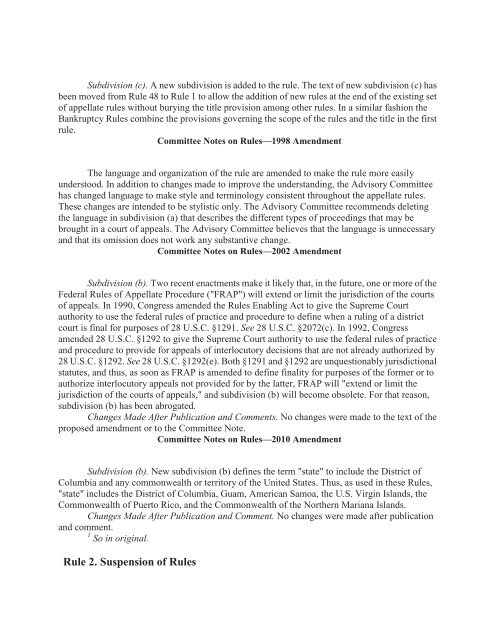Federal Rules of Appellate Procedure 2014-2015, 2014a
Federal Rules of Appellate Procedure 2014-2015, 2014a
Federal Rules of Appellate Procedure 2014-2015, 2014a
You also want an ePaper? Increase the reach of your titles
YUMPU automatically turns print PDFs into web optimized ePapers that Google loves.
Subdivision (c). A new subdivision is added to the rule. The text <strong>of</strong> new subdivision (c) has<br />
been moved from Rule 48 to Rule 1 to allow the addition <strong>of</strong> new rules at the end <strong>of</strong> the existing set<br />
<strong>of</strong> appellate rules without burying the title provision among other rules. In a similar fashion the<br />
Bankruptcy <strong>Rules</strong> combine the provisions governing the scope <strong>of</strong> the rules and the title in the first<br />
rule.<br />
Committee Notes on <strong>Rules</strong>—1998 Amendment<br />
The language and organization <strong>of</strong> the rule are amended to make the rule more easily<br />
understood. In addition to changes made to improve the understanding, the Advisory Committee<br />
has changed language to make style and terminology consistent throughout the appellate rules.<br />
These changes are intended to be stylistic only. The Advisory Committee recommends deleting<br />
the language in subdivision (a) that describes the different types <strong>of</strong> proceedings that may be<br />
brought in a court <strong>of</strong> appeals. The Advisory Committee believes that the language is unnecessary<br />
and that its omission does not work any substantive change.<br />
Committee Notes on <strong>Rules</strong>—2002 Amendment<br />
Subdivision (b). Two recent enactments make it likely that, in the future, one or more <strong>of</strong> the<br />
<strong>Federal</strong> <strong>Rules</strong> <strong>of</strong> <strong>Appellate</strong> <strong>Procedure</strong> ("FRAP") will extend or limit the jurisdiction <strong>of</strong> the courts<br />
<strong>of</strong> appeals. In 1990, Congress amended the <strong>Rules</strong> Enabling Act to give the Supreme Court<br />
authority to use the federal rules <strong>of</strong> practice and procedure to define when a ruling <strong>of</strong> a district<br />
court is final for purposes <strong>of</strong> 28 U.S.C. §1291. See 28 U.S.C. §2072(c). In 1992, Congress<br />
amended 28 U.S.C. §1292 to give the Supreme Court authority to use the federal rules <strong>of</strong> practice<br />
and procedure to provide for appeals <strong>of</strong> interlocutory decisions that are not already authorized by<br />
28 U.S.C. §1292. See 28 U.S.C. §1292(e). Both §1291 and §1292 are unquestionably jurisdictional<br />
statutes, and thus, as soon as FRAP is amended to define finality for purposes <strong>of</strong> the former or to<br />
authorize interlocutory appeals not provided for by the latter, FRAP will "extend or limit the<br />
jurisdiction <strong>of</strong> the courts <strong>of</strong> appeals," and subdivision (b) will become obsolete. For that reason,<br />
subdivision (b) has been abrogated.<br />
Changes Made After Publication and Comments. No changes were made to the text <strong>of</strong> the<br />
proposed amendment or to the Committee Note.<br />
Committee Notes on <strong>Rules</strong>—2010 Amendment<br />
Subdivision (b). New subdivision (b) defines the term "state" to include the District <strong>of</strong><br />
Columbia and any commonwealth or territory <strong>of</strong> the United States. Thus, as used in these <strong>Rules</strong>,<br />
"state" includes the District <strong>of</strong> Columbia, Guam, American Samoa, the U.S. Virgin Islands, the<br />
Commonwealth <strong>of</strong> Puerto Rico, and the Commonwealth <strong>of</strong> the Northern Mariana Islands.<br />
Changes Made After Publication and Comment. No changes were made after publication<br />
and comment.<br />
1 So in original.<br />
Rule 2. Suspension <strong>of</strong> <strong>Rules</strong>


















